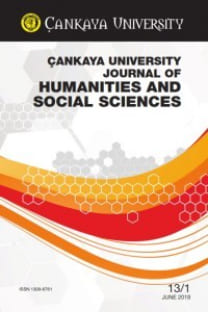Berlin’in Psikocoğrafyası: David Hare’in Berlin ve Mark Ravenhill’in Over There Adlı Oyunları
Psikocoğrafya, coğrafi koşulların insanlar üzerindeki psikolojik etkilerinin incelenmesidir. Guy Debord ve Sitüasyonistler psikocoğrafyayı metropollerin radikal dönüşümü için politik düzeyde bir araç olarak kullanırlar. Bu nedenle, birçok yazar da kavramdan, kentlerin psikolojik manzarasını incelemek için bir teknik olarak yararlanmaktadır. İnceleme konusu olan oyunlarda David Hare ve Mark Ravenhill, fiziksel bir engel olarak tasvir ettikleri Berlin Duvarı’na karşı oyun karakterlerinin nasıl tepki verdiklerini, Berlin Duvarı öncesi ve sonrası küresel koşullar bağlamında göstermeye çalışmaktadır ve Berlin’in gündelik yaşamına eleştirel bir gözle bakarak Berlinliler arasındaki fiziksel ve psikolojik sınırları keşfe çıkmaktadır. Bu bağlamda, Berlin’i bir sınır bölgesi olarak betimleyen oyun yazarları Berlin Duvarı’nın bireylerin kimlikleri, siyasal görüşleri ve yaşamları üzerindeki etkisini göstermeye çabalamaktadırlar. Hare ve Ravenhill Berlin’i, küresel kapitalizmin ve tüketim kültürünün baskısı altında yaşayan Berlinlilerle birlikte, artık var olmayan bir duvarla ayrılmış gizemli bir kent olarak tanımlamaktadır. Bu çalışma, Debordyen bir çerçeve kullanarak, David Hare’in Berlin ve Mark Ravenhill’in Over There oyunlarına konumlanan psikocoğrafyanın varlığını incelemektedir.
Anahtar Kelimeler:
Psikocoğrafya, David Hare, Mark Ravenhill, Berlin, Over There
The Psychogeography of Berlin: David Hare’s Berlin and Mark Ravenhill’s Over There
Psychogeography deals with the psychological impact of geographical conditions on people. Guy Debord and the Situationists use it on a political level for the radical transformation of metropolises. Thus, many writers utilize the concept as a technique for analysing the psychological landscape of cities. In the plays under consideration, David Hare and Mark Ravenhill portray how their characters respond to the effects of the Berlin Wall as a physical barrier as they attempt to represent pre-Wall and post-Wall global circumstances. Hare and Ravenhill explore the physical and psychological boundaries between Berliners with a critical eye on the daily life of Berlin. In this context, they portray Berlin as a borderland and demonstrate the impact of the Berlin Wall on people’s identities, political views, and life. The playwrights describe Berlin as a mysterious city separated by a defunct wall, with Berliners living under the oppression of global capitalism and consumerism. Using a Debordian framework, this study examines the existence of psychogeography in David Hare’s Berlin and Mark Ravenhill’s Over There.
Keywords:
Psychogeography, David Hare, Mark Ravenhill, Berlin, Over There,
___
- Akarık, Gökçe. Temporality and Spatiality in Contemporary British Theatre. MA Thesis. University of Gaziantep, 2020.
- Altun, Ali. David Hare’in Oyunlarına Yansıyan Küresel Olaylara Eleştirel Bir Bakış. PhD Thesis. Atatürk University, 2019.
- Baudelaire, Charles. The Painter of Modern Life and Other Essays, edited and translated by Jonathan Mayne, Phaidon Press, 1964.
- Billington, Michael. “Over There.” The Guardian 9 March 2009, Over There | Theatre | The Guardian. Accessed 30 September 2021.
- Coverley, Merlin. The Art of Wandering: The Writer as Walker, Oldcastle Books, 2012.
- Coverley, Merlin. Psychogeography, Pocket Essentials, 2006.
- Debord, Guy. The Society of the Spectacle. Translated by Donald Nicholson-Smith. Zone Books, 1995.
- Debord, Guy. Theory of the Dérive, Situationist International, www.cddc.vt.edu/sionline/si/theory. 1958. Accessed 27 September 2021.
- Elkin, Lauren. Flaneuse: Women Walk the City in Paris, New York, Tokyo, Venice and London, Chatto & Windus, 2016.
- Gültekin, Hakan. The Critique of Neoliberalism in David Hare’s Plays, Çizgi Kitabevi Publishing, 2021. Hare, David. Berlin/Wall, Faber and Faber, 2009.
- Kaya, Kağan. “Berlin/Wall: Hare’s Eyes on Two Walls of the World.” Pamukkale University Journal of Social Sciences Institute, no. 14, 2013, pp. 37-46.
- Knabb, Ken. Situationist International Anthology, Bureau of Public Secrets, 2006.
- Löffler, Catharina. Walking in the City: Urban Experience and Literary Psychogeography in Eighteenth-Century London, J. B. Metzler, 2017.
- Murrah, Christopher David. This All Seems Quite Personal: Bringing Over There Over Here, M.F.A. Thesis. Columbia University, 2016.
- Ravenhill, Mark. Plays: 3: Shoot/Get Treasure/Repeat, Over There, A Life in Three Acts, Ten Plagues, Ghost Story, The Experiment, Bloomsbury, 2013.
- Richardson, Tina. Walking Inside Out: Contemporary British Psychogeography, Rowman Littlefield International Ltd., 2015.
- Saunders, Graham. “Mark Ravenhill.” Modern British Playwriting: the 1990s, edited by Aleks Sierz, Methuen Drama, 2012, pp. 163-188.
- Self, Will. Psychogeography: Disentangling the Modern Conundrum of Psyche and Place, Bloomsbury, 2007.
- Tally, Robert T. Spatiality, Routledge, 2013.
- ISSN: 1309-6761
- Yayın Aralığı: Yılda 2 Sayı
- Başlangıç: 2004
- Yayıncı: Çankaya Üniversitesi
Sayıdaki Diğer Makaleler
Feride SÜMBÜL, Selmin SÖYLEMEZ
Berlin’in Psikocoğrafyası: David Hare’in Berlin ve Mark Ravenhill’in Over There Adlı Oyunları
Varoluşculuğun İmgeleri: Heidegger, Camus, and Levinas
Asterix’te Özel İsimlerin Sinhala’ya Çevirisi Üzerine
Samanthi JAYAWARDENA, Judith Sumindi RODRİGO
Türkçe’de Kanıtsallığa Kullanıma Dayalı Yapı Gramer Yaklaşımı: Kanıtsallık Yapısı
Chaucer’ın Düşes’in Kitabı adlı Şiirinde Hastalık ve İyileşmeye Dair
